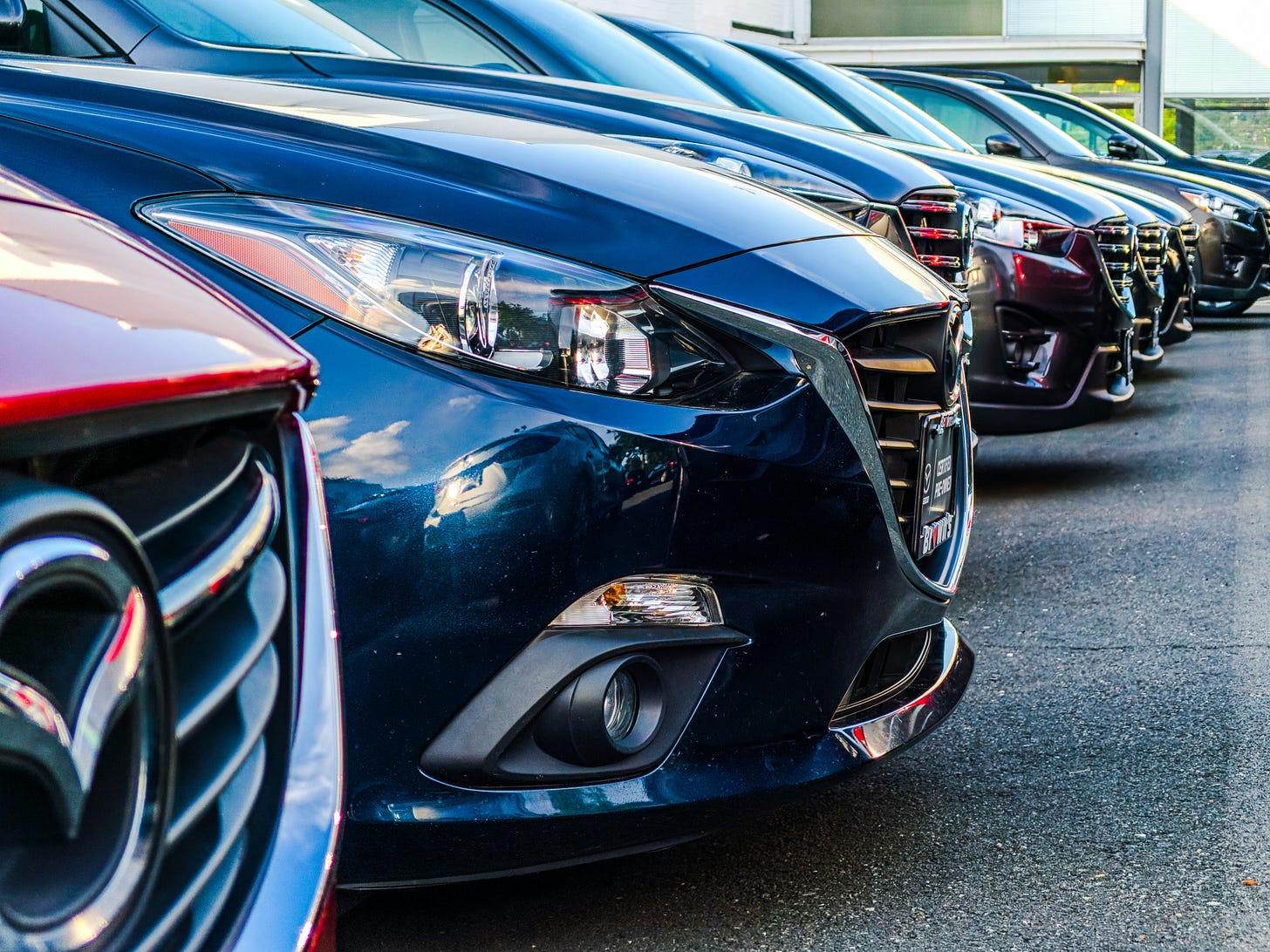Car dealers try to keep a chokehold on new car sales in Florida
Using courts and compliant politicians, Florida car dealers are fighting to keep Floridians from buying electric vehicles directly from the companies that make them.

This is Seeking Rents, a newsletter and podcast devoted to producing original journalism — and lifting up the work of others — about Florida politics, with an emphasis on the ways that big businesses and other special interests influence public policy in the state. Seeking Rents is produced by veteran investigative journalist Jason Garcia, and it is free to all. But please consider a voluntary paid subscription, if you can afford one, to help support our work. And check out our video channel, too.
Car dealerships are trying to keep a chokehold on new car sales in Florida — and they are using state courts and compliant politicians to do it.
Some of Florida’s largest car dealers have launched a lawsuit attempting to shut down sale reservations by a Volkswagen-backed startup developing a new line of electric SUVs and pickup trucks that the company intends to sell directly to consumers over an app.
At the same time, dealer industry lobbyists are pressing Florida’s Republican-controlled Legislature to pass a new bill that would make it even easier for dealers to to crush potential competition.
The moves are the latest offensives in a multi-year legal and lobbying campaign by Florida car dealers to prevent Floridians from buying new electric vehicles directly from the companies that make them — and to force people to continue paying higher prices to middlemen dealers instead.
The dealer lobby has spent months preparing for its next battle in Tallahassee. The top executive at the industry’s main trade group — the Florida Automobile Dealers Association — even called on members to give money to Florida lawmakers during the 2024 election in order to help pass an industry-friendly bill during the 2025 legislative session, which begins next month.
“FADA right now is planning a piece of legislation,” Ted Smith, the president of the lobbying association, said in an August video message to dealership owners. “So I need your help. I really want you to get connected to your local member.
“If you would do that — and then call FADA — perhaps we could put a CARPAC check in your hands for that person running for the House or that person running for the Senate,” Smith added. “You add in your check, and we make a friend. We open a door for further communication when we start talking about our bill.”
Car dealers are some of the largest campaign contributors in state politics.
During the fall elections, for instance, records show that Braman Motors — a dealership group led by Miami billionaire Norman Braman — gave $100,000 to Sen. Ben Albritton, a Republican from Wauchula who is now the president of the Florida Senate.
And just this month, records show that FADA cut a $50,000 check to Rep. Sam Garrison, a Republican from Fleming Island who will soon become speaker of the state House.
The car dealers’ litigation and the legislation appeared almost simultaneously: The lawsuit was filed in Miami on Feb. 3, and the bill surfaced 48 hours later in Tallahassee.
Since the suit appeared first, let’s start with it.
The litigation
Brought by a group of Volkswagen and Audi dealers — including dealerships owned by giants like Braman, Morgan Auto Group, and Rick Case Automotive Group — the suit targets a company called Scout Motors.
Scout was an American car brand in the 1960s and 1970s that has been resurrected by German automaker Volkswagen and turned into a standalone company that will make electric SUVs and pickup trucks in the U.S.
Scout won’t begin production until 2027. But it announced last fall that it plans to bypass traditional car dealers and sell directly to consumers — much like other EV companies, such as Tesla and Rivian. Volkswagen executives said last month that Scout has already received more than 50,000 refundable reservation deposits from potential buyers.
But the Florida VW and Audi dealers claim that Scout is violating Florida’s “Motor Vehicle Dealer Act.” That’s a set of decades-old franchising laws that forbid most car manufacturers from selling their vehicles to consumers and require them to instead distribute through networks of local dealers that each have geographic territories to themselves.
It’s an absurdly outdated system. Florida’s dealer franchising laws — which other states also have — stem from an era when the car business was dominated by the Big Three automakers in Detroit and most car dealers were fragile family operations vulnerable to exploitation.
That’s nothing like the modern car market, where there is now far more competition among car manufacturers — and car dealers, empowered by protectionist state laws and industry consolidation, have ballooned into big corporations themselves. The list of Florida’s largest private companies, for instance, is filled with car dealers.
These antiquated laws force most new car sales to be made through monopolistic middleman. They enrich owners of car dealerships. They force consumers to pay higher prices. And they given an unfair competitive advantage to newer car companies like Elon Musk’s Tesla, which aren’t bogged down by a bunch of state-supported dealers standing between the company and its customers.
And yet these are the very same laws that a group of Florida VW and Audi dealers are now wielding in an effort to stop Floridians from reserving cars from Scout.
Why? Because the dealers don’t want the competition.
“In the Motor Vehicle Dealer Act, the Florida Legislature has adopted provisions to ensure that the continued existence of Florida franchised dealers is not threatened by competition from the franchisor manufacturers, distributors, or their common entities, on which the dealers rely for their economic livelihood,” attorneys for the VW and Audi dealers wrote in the complaint filed in Miami-Dade Circuit Court.
Scout hasn’t yet responded to the suit, though the company has said selling directly to consumers will make for a far better experience for shoppers.
“From the start, customers will know what they are paying and can expect full price transparency. Vehicle purchases will be completed in minutes, not hours,” Cody Thacker, Scout’s vice president of commercial operations, said when Scout announced its direct sales plans last fall. “Consumers overwhelmingly tell us they want the freedom to pursue the purchasing experience of their choice. We intend to give them that choice."
The legislation
Then there’s the new bill that just appeared in Tallahassee — a bill that would make it even easier for dealers to weaponize Florida’s old franchising laws.
The legislation is House Bill 429, and it includes a few items on the dealer lobby’s wish list.
But most importantly to the industry is a provision that would empower the Florida Automobile Dealers Association to sue car manufacturers itself — rather than requiring individual dealers to bring lawsuits.
“We know that some [car manufacturers] — not all — are violating Florida franchise law,” Smith said in the August video for FADA members. “And I keep going back to this: It’s very important that you tell your local members at home this fall that you don’t want to have to get into a legal action with your automaker. You would like FADA to be able to stand in your shoes.”
This is a power that the car dealer lobby has been trying to seize for years, particularly as it has fought to keep control of the electric vehicle market.
In 2021, for instance, the Florida Automobile Dealers Association tried to get a state court to stop Hyundai from making dealers sign new franchise agreements if they wanted to sell Hyundai’s electric Ioniq cars. And in 2023, FADA filed a federal lawsuit trying to stop Ford from making its dealers agree commit to transparent, no-haggle pricing if they wanted to sell a new line of EVs.
In both cases, judges ruled that FADA did not have standing to sue itself.
House Bill 429 would upend that.
The history
There are a couple of points that are important to keep in mind here.
First, this is the second time in three years that Florida car dealers have turned to Tallahassee for help in trying to maintain their stranglehold on car sales.
In 2023, the car dealers successfully lobbied Gov. Ron DeSantis and the Florida Legislature to pass House Bill 637. That bill was specifically written to block attempts like those of Ford and Hyundai to sell electric vehicles directly to consumers — though Florida Republicans made sure to slip in a carveout for Tesla, the company run by Musk, the billionaire donor and advisor to President Donald Trump.
Second, this is exactly the opposite of what free-market supporters should be doing. Independent economists have been urging states for years to roll back anti-competitive dealer-franchising laws — doing so, they say, would lower prices and improve innovation across the car industry.
And third, some other states are actually considering changes that would prioritize consumers over car dealers. For instance, legislators in South Carolina — where Scout Motors is building a $2 billion factory — have been debating a bill this year that would allow South Carolinians to buy their electric vehicles directly from manufacturers.
It’s been dubbed the “South Carolina Consumer Freedom Act.”
Correction: An earlier version of this story misstated the number of hours between when the car dealer lawsuit was filed in Miami and House Bill 429 was filed in Tallahassee.







While I’m not a big fan of car dealerships, we should acknowledge that these are generally local businesses supporting our communities. The jobs are local and service (such as it is) is local. I doubt that we want to follow the Amazon model.
Common in NC and NJ, too. Car Dealers,
like similar trade associations, often exist to kill competition.